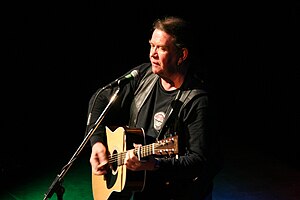Clan Alba
| Dick Gaughan | |
|---|---|

Gaughan at the "Rätsche" in Geislingen an der Steige, Germany, May 2006
|
|
| Background information | |
| Birth name | Richard Peter Gaughan |
| Born |
17 May 1948 Glasgow, Scotland |
| Genres | Protest songs, folk, Folk rock, Celtic music |
| Occupation(s) | Musician, songwriter composer, Orchestrator |
| Instruments | Vocals, guitar, |
| Associated acts | The Boys of the Lough, Five Hand Reel, Clan Alba |
| Website | Dick Gaughan's Website |
Richard Peter Gaughan usually known as Dick Gaughan (born 17 May 1948, Glasgow) is a Scottish musician, singer, and songwriter, particularly of folk and social protest songs. He is widely regarded as one of Scotland's finest folk singers and guitarists.
Gaughan was born in Glasgow's Rottenrow Maternity Hospital, when his father was working in Glasgow as an engine driver. He spent the first year-and-a-half of his life in Rutherglen, South Lanarkshire, after which the whole family moved to Leith, a port on the outskirts of Edinburgh.
The eldest of three children, Gaughan grew up surrounded by the music of both Scotland and Ireland. His mother, a Highland Scot who spoke Gaelic, had as a child won a silver medal for singing at a Gaelic Mòd. His Leith-born father played guitar, his Irish grandfather played the fiddle and his Glaswegian grandmother played button accordion. The family experienced considerable poverty, but the area they lived in possessed a strong community spirit and many of Gaughan's songs celebrate his working-class roots. In his teens Gaughan served an apprenticeship at a local paper mill, but had wanted to be a musician since he first started playing guitar at the age of seven. He got involved with the local folk music scene and, with two others, started a club called the Edinburgh Folk Centre. He turned professional in early 1970 and moved to London.
Gaughan's first album, No More Forever, was recorded in 1971. On it he sings and plays acoustic guitar, joined on some tracks by fiddler Aly Bain. All the songs except one are traditional, the exception being Hamish Henderson's "The John Maclean March", a tribute to the Glasgow socialist John Maclean and a foretaste of the many politically committed songs that Gaughan would later record. In 1972, before his album was released, Gaughan joined Bain, Cathal McConnell and Robin Morton, all of whom he had known from his Edinburgh Folk Centre days, in their group The Boys of the Lough. He stayed with the group for about a year, during which he played and sang on their eponymous debut album. He gave his reason for leaving the group as fear of flying, which was incompatible with the group's travelling commitments.
...
Wikipedia
